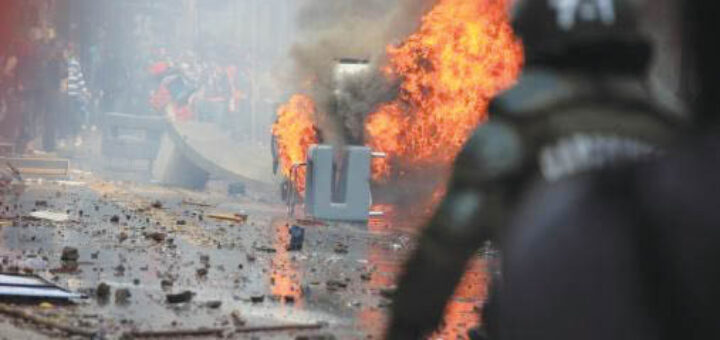Kazakhstan’s Future is Uncertain Amid Violent Demonstrations and Mass Arrests

By Matthew Hillier, Staff Writer
After months of steadily increasing tension in Kazakhstan, last week has seen a rapid explosion of both political and social unrest as the Central Asian nation unravels into massive protests.
Kazakhstan shares a border with Russia and China and is a valuable addition to the region due to the large oil and gas resources in the country. Georank, a website that compares the economic indicators of countries, ranks Kazakhstan at number 55 for gross domestic product (GDP) production in the world which can be credited to its vast energy industry. Despite being wedged between two global superpowers, these vast resources have kept Kazakhstan politically and economically relevant.
Kazakhstan’s recent rise in political unrest is also credited to the reliance on the energy industry running the country’s economy. According to BBC News, protests began when the government removed the price cap on petroleum gas, effectively doubling the price overnight. This was unacceptable to many as the country’s annual income per citizen of $3 269.48 USD has made petroleum an expense many couldn’t afford even before the price increase.
This drove many citizens to organize mass protests in Kazakhstan’s capital city, Almaty. BBC News reports that protests were motivated both by the aforementioned rise in petroleum prices and the already-lingering resentment towards Kazakhstan’s government. In particular, its former president Nursultan Nazarbayev who, despite resigning in 2019, continued to hold a position as the leader of the country’s security council.
Journalists from BBC News noted that the demonstrations began on Jan. 2 and were quickly met with a swift government crackdown. Security forces were ordered to fire on demonstrators without warning after the crowds attempted to gain control of local police stations following a surge in support in the capital city.
Following this, more protests across the country sprung up due to the crackdown in Almaty.
After days of crackdowns on demonstrators by Nazarbayev and the security forces under his orders, the protests and riots across Kazakhstan reached a fever pitch. Demonstrators occupied and burned down several government buildings in Almaty.
Following the destruction of these government buildings, President Kassym-Jomart Tokayev announced that 2, 500 soldiers, sourced from six allied countries and led by Russian soldiers, would be aiding local forces in helping put an end to the violent demonstrations.
After these soldiers arrived, a sharp increase in attacks on security forces present in the cities was noticed. Both the security forces and the new soldiers responded with deadly force and mass arrests, further fueling the demonstrators’ anger. At the time of writing, 160 people have been killed with thousands more injured and a total of 5,000 people arrested according to sources from The Associated Press and CBC News.
These numbers are hard to verify however, as internet and communications blackouts across the country are still in effect. The government of Kazakhstan remains tight-lipped about the severity of the violence happening during the demonstrations and is likely suppressing the true scope of these massive demonstrations and the actions of the security forces responsible for stopping them.
On Jan. 8, Karim Massimov, a prominent member of the country’s intelligence agency and staunch supporter of Nazarbayev, was arrested for treason by President Tokayev. Nazarbayev was then ousted from his position following Massimov’s arrest, with the role of security chief being taken by Tokayev and Massimov’s position being taken by the head of Tokayev’s own personal security detail.
Nazarbayev was a favourite target of demonstrators who shouted “Old man, go away!” while tearing down recently erected statues of the former president. This transition of political power is tied to a long struggle between former President Nazarbayev’s family and pro-Russian politicians looking to reestablish Russia’s waning influence in the Kazakhstan government. The Nazarbayev family has had control over a majority of the energy industry in Kazakhstan. This wealth and influence have put several members of the family in high-ranking government positions even before Kazakhstan’s independence from the Soviet Union.
The Nazarbayev family has used their resources and influence to expand trade to China and several western nations, putting them at odds with several pro-Russian politicians looking to secure Kazakhstan’s energy industry in Russia and its allies. This can be seen in Massimov’s arrest as he was an expert in the Nazarbayev family’s trade with China and his charges of “treason” have yet to be clarified by President Tokayev.
Naturally, this crisis has turned the heads of the global community. As a country with massive contributions to the oil and gas industry that shares a border with the superpowers of China and Russia, Kazakhstan is the last place many wish to see a level of unrest not seen since the country’s independence from the Soviet Union.
Canadian Foreign Affairs Minister Mélanie Joly called for restraint and de-escalation earlier this week in a statement while Russian-led troops began to enter the country. “We urge that the situation in Kazakhstan be resolved quickly and through peaceful dialogue,” she said.
Joly also stated the importance of human rights amid the intense crackdown on demonstrators by Kazakhstan’s security forces. She said, “We emphasize the importance of upholding democratic values, respecting human rights, and refraining from violence and destruction.”
Canada also has a large stake in the outcome of this political crisis, as Canada’s biggest trade partner in Central Asia is Kazakhstan. Canada had four hundred million dollars worth of products from Kazakhstan imported last year.





